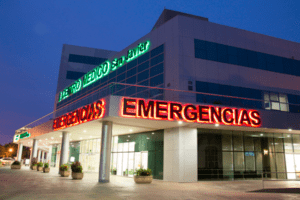We’ve all experienced an unexpected sickness while traveling, possibly caused by an undercooked piece of meat from the local “go-to” restaurant or maybe a virus that was contracted earlier inconveniently rearing its ugly head 2,000 miles from home. Sickness does not discriminate; the anxiety triples when we are in a foreign country and worsens if we can’t speak the local language. Unfortunately, some foreign healthcare facilities are taking advantage of these circumstances. Sick and vulnerable, individuals turn to local healthcare facilities and hospitals only to be given inadequate care and held captive beneath financial stipulations and insurance incongruences. Not only do these practices infringe upon traveler’s personal healthcare security, but they also continually expose the vulnerabilities of unprepared travelers. Specifically, in Mexico, many healthcare facilities have been scrutinized for their negligent medical practices and procedures.
In May of 2016, a report published by the Overseas Security Advisory Council (OSAC), a sector of the United States Department of State Bureau of Diplomatic Security, proving that hospitals in Los Cabos, Mexico were treating patients in unethical manners. The examples of malpractice include, but are not limited to, “price gouging, nontransparent billing procedures, and obstructing medical release and evacuation.” All of which subject the patient to an extreme vulnerability in an unfamiliar place.

A similar scenario was documented last month by Fox News World, concerning an Idaho teacher who was forced to pay $40,000 worth of hospital bills before the facility would permit her release. With insurmountable fees compounding, the Moormann family contemplated selling their home in order to retrieve their displaced family member; but due to increased news coverage and compliance between the Moorman family and Hospital San Javier Nayarit Administration, Vikki was eventually released.
The Moormann family’s experience, the OSAC report and travel warnings have done little to slow down travel to Mexico, as international tourism jumped 9% in 2016 from the previous year. Americans provided a large portion of that revenue as 7.78 million US visitors traveled south of the border from January 2016 – October 2016. According to these statistics and proximity to the United States, decreased tourism to Mexico is not foreseen; therefore, what precautions can we take to ensure that we aren’t subjected to substantial healthcare fees and unethical practices if we get sick?
Universal policies on this issue have not been enacted, although countries such as India, have demonstrated their intolerance of similar behavior by hospitals. In an article published by NDTV in April of 2017, the Delhi High Court reprimanded a “private hospital for holding patients ‘hostage’ to extract money for unpaid bills.” However, it is going to take more than a “slap on the wrist” for hospitals to abandon their disturbing notions of monetary control.

These situations are increasing in incidence for travelers exiting the borders of the United States, and should not be overlooked when preparing for departure. It is important to have cash readily available for up-front hospital payments and emergency circumstances. Additionally, pre-departure planning is imperative to ensure a seamless trip.
To avoid these nightmarish occurrences, VIGILINT recommends enlisting in our Global MedAssist Program (GMAP). GMAP assists travelers with around the clock immediate access to viable and reputable healthcare providers who deliver comprehensive individualized healthcare solutions and continuity of care throughout the medical ordeal.
The illegalities of hospital hostages are often overlooked by international ethics. Nonetheless, becoming a hostage to one’s own healing is impermissible within any ideology. World travel should not be limited by apprehension to proper medical care, but instead, should be eased by medical providers and analysts who are conscious of their traveler’s safety and success.
